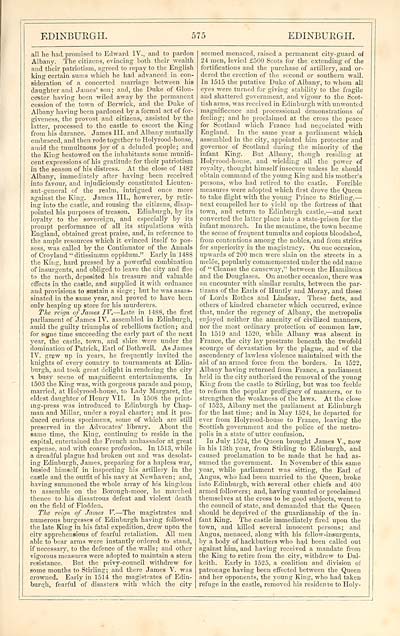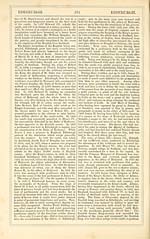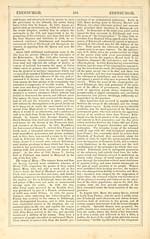Download files
Complete book:
Individual page:
Thumbnail gallery: Grid view | List view

EDINBUEGH.
575
EDINBUEGH.
all he had promised to Edward IV., and to pardon
Albany. The citizens, evincing both their wealth
and their patriotism, agreed to repay to the English
king certain sums which he had advanced in con-
sideration of a concerted marriage hetween his
daughter and James' son; and, the Duke of Glou-
cester having been wiled away by the permanent
cession of the town of Berwick, and the Duke of
Albany having been pardoned by a formal act of for-
giveness, the provost and citizens, assisted by the
latter, processed to the castle to escort the King
from his durance. James III. and Albany mutually
embraced, and then rode together to Holyrood-house,
amid the tumultuous joy of a deluded people; and
the King bestowed on the inhabitants some munifi-
cent expressions of his gratitude for their patriotism
in the season of his distress. At the close of 1482
Albany, immediately after having been received
into favour, and injudiciously constituted Lieuten-
ant-general of the realm, intrigued once more
against the King. James III., however, by retir-
ing into the castle, and rousing the citizens, disap-
pointed his purposes of treason. Edinburgh, by its
loyalty to the sovereign, and especially by its
prompt performance of all its stipulations with
England, obtained great praise, and, in reference to
the ample resources which it evinced itself to pos-
sess, was called by the Continuator of the Annals
of Croyland " ditissimum oppidum." Early in 1488
the King, hard pressed by a powerful combination
of insurgents, and obliged to leave the city and flee
to the north, deposited his treasure and valuable
effects in the castle, and supplied it with ordnance
and provisions to sustain a siege ; but he was assas-
sinated in the same year, and proved to have been
only heaping up store for his murderers.
The reign of James IV. — Late in 14S8, the first
parliament of James IV. assembled in Edinburgh,
amid the guilty triumphs of rebellious faction; and
for sqjne time succeeding the early part of the next
year, the castle, town, and shire were under the
domination of Patrick, Earl of Bothwell. As James
IV. grew up in years, he frequently invited the
knights of every country to tournaments at Edin-
burgh, and took great delight in rendering the city
a busy scene of magnificent entertainments. In
1503 the King was, with gorgeous parade and pomp,
married, at Holyrood-house, to Lady Margaret, the
eldest daughter of Henry VII. In 1508 the print-
ing-press was introduced to Edinburgh by Chap-
man and Millar, under a royal charter; and it pro-
duced curious specimens, some of which are still
preserved in the Advocates' library. About the
same time, the King, continuing to reside in the
capital, entertained the French ambassador at great
expense, and with coarse profusion. In 1513, while
a areadful plague had broken out and was desolat-
ing Edinburgh, James, preparing for a hapless war,
busied himself in inspecting his artillery in the
castle and the outfit of his navy at Newhaven ; and,
having summoned the whole array of his kingdom
to assemble on the Borough-moor, he marched
thence to his disastrous defeat and violent death
on the field of Flodden.
Tlie reign of James Y. — The magistrates and
numerous burgesses of Edinburgh having followed
the late King in his fatal expedition, drew upon the
city apprehensions of fearful retaliation. All men
able to bear arms were instantly ordered to stand,
if necessaiy, to the defence of the walls ; and other
vigorous measures were adopted to maintain a stern
resistance. But the privy-council withdrew for
some months to Stirling; and there James V. was
crowned. Early in 1514 the magistrates of Edin-
burgh, fearful of disasters with which the city
seemed menaced, raised a permanent city-guard of
24 men, levied £500 Scots for the extending of the
fortifications and the purchase of artillery, and or-
dered the erection of the second or southern wall.
In 1515 the putative Duke of Albany, to whom all
eyes were turned for giving stability to the fragile
and shattered government, and vigour to the Scot-
tish arms, was received in Edinburgh with unwonted
magnificence and processional demonstrations of
feeling; and he proclaimed at the cross the peace
for Scotland which France had negociated with
England. In the same year a parliament which
assembled in the city, appointed him protector and
governor of Scotland during the minority of the
infant King. But Albany, though residing at
Holyrood-house, and wielding all the power of
royalty, thought himself insecure unless he should
obtain command of the young King and his mother's
persons, who had retired to the castle. Forcible
measures were adopted which first drove the Queen
to take flight with the young Prince to Stirling, —
next compelled her to yield up the fortress of that
town, and return to Edinburgh castle, — and next
converted the latter place into a state-prison for the
infant monarch. In the meantime, the town became
the scene of frequent tumults and copious bloodshed,
from contentions among the nobles, and from strifes
for superiority in the magistracy. On one occasion,
upwards of 200 men were slain on the streets in a
melee, popularly commemorated under the odd name
of " Cleanse the causeway," between the Hamiltons
and the Douglases. On another occasion, there was
an encounter with similar results, between the par-
tisans of the Earls of Huntly and Moray, and those
of Lords Eothes and Lindsay. These facts, and
others of kindred character which occurred, evince
that, under the regency of Albany, the metropolis
enjoyed neither the amenity of civilized manners,
nor the most ordinary protection of common law.
In 1519 and 1520, while Albany was absent in
France, the city lay prostrate beneath the twofold
scourge of devastation by the plague, and of the
ascendency of lawless violence maintained with the
aid of an armed force from the borders. In 1522,
Albany having returned from France, a parliament
held in the city authorised the removal of the young
King from the eastle to Stirling, but was too feeble
to reform the popular profligacy of manners, or to
strengthen the weakness of the laws. At the close
of 1523, Albany met the parliament at Edinburgh
for the last time; and in May 1524, he departed for-
ever from Holyrood-house to France, leaving the
Scottish government and the police of the metro-
polis in a state of utter confusion.
In July 1524, the Queen brought James V., now
in his 13th year, from Stirling to Edinburgh, and
caused proclamation to be made that he had as-
sumed the government. In November of this same
year, while parliament was sitting, the Earl of
Angus, who had been married to the Queen, broke
into Edinburgh, with several other chiefs and 400
armed followers ; and, having vaunted or proclaimed
themselves at the cross to be good subjects, went to
the council of state, and demanded that the Queen
should be deprived of the guardianship of the in-
fant King. The castle immediately fired upon the
town, and killed several innocent persons; and
Angus, menaced, along with his fellow-insurgents,
by a body of hackbutters who had been called out
against him, and having received a mandate from
the King to retire from the city, withdrew to Dal-
keith. Early in 1525, a coalition and division of
patronage having been effected between the Queen
and her opponents, the young King, who had taken
refuge in the castle, removed his residen Be to Holy-
575
EDINBUEGH.
all he had promised to Edward IV., and to pardon
Albany. The citizens, evincing both their wealth
and their patriotism, agreed to repay to the English
king certain sums which he had advanced in con-
sideration of a concerted marriage hetween his
daughter and James' son; and, the Duke of Glou-
cester having been wiled away by the permanent
cession of the town of Berwick, and the Duke of
Albany having been pardoned by a formal act of for-
giveness, the provost and citizens, assisted by the
latter, processed to the castle to escort the King
from his durance. James III. and Albany mutually
embraced, and then rode together to Holyrood-house,
amid the tumultuous joy of a deluded people; and
the King bestowed on the inhabitants some munifi-
cent expressions of his gratitude for their patriotism
in the season of his distress. At the close of 1482
Albany, immediately after having been received
into favour, and injudiciously constituted Lieuten-
ant-general of the realm, intrigued once more
against the King. James III., however, by retir-
ing into the castle, and rousing the citizens, disap-
pointed his purposes of treason. Edinburgh, by its
loyalty to the sovereign, and especially by its
prompt performance of all its stipulations with
England, obtained great praise, and, in reference to
the ample resources which it evinced itself to pos-
sess, was called by the Continuator of the Annals
of Croyland " ditissimum oppidum." Early in 1488
the King, hard pressed by a powerful combination
of insurgents, and obliged to leave the city and flee
to the north, deposited his treasure and valuable
effects in the castle, and supplied it with ordnance
and provisions to sustain a siege ; but he was assas-
sinated in the same year, and proved to have been
only heaping up store for his murderers.
The reign of James IV. — Late in 14S8, the first
parliament of James IV. assembled in Edinburgh,
amid the guilty triumphs of rebellious faction; and
for sqjne time succeeding the early part of the next
year, the castle, town, and shire were under the
domination of Patrick, Earl of Bothwell. As James
IV. grew up in years, he frequently invited the
knights of every country to tournaments at Edin-
burgh, and took great delight in rendering the city
a busy scene of magnificent entertainments. In
1503 the King was, with gorgeous parade and pomp,
married, at Holyrood-house, to Lady Margaret, the
eldest daughter of Henry VII. In 1508 the print-
ing-press was introduced to Edinburgh by Chap-
man and Millar, under a royal charter; and it pro-
duced curious specimens, some of which are still
preserved in the Advocates' library. About the
same time, the King, continuing to reside in the
capital, entertained the French ambassador at great
expense, and with coarse profusion. In 1513, while
a areadful plague had broken out and was desolat-
ing Edinburgh, James, preparing for a hapless war,
busied himself in inspecting his artillery in the
castle and the outfit of his navy at Newhaven ; and,
having summoned the whole array of his kingdom
to assemble on the Borough-moor, he marched
thence to his disastrous defeat and violent death
on the field of Flodden.
Tlie reign of James Y. — The magistrates and
numerous burgesses of Edinburgh having followed
the late King in his fatal expedition, drew upon the
city apprehensions of fearful retaliation. All men
able to bear arms were instantly ordered to stand,
if necessaiy, to the defence of the walls ; and other
vigorous measures were adopted to maintain a stern
resistance. But the privy-council withdrew for
some months to Stirling; and there James V. was
crowned. Early in 1514 the magistrates of Edin-
burgh, fearful of disasters with which the city
seemed menaced, raised a permanent city-guard of
24 men, levied £500 Scots for the extending of the
fortifications and the purchase of artillery, and or-
dered the erection of the second or southern wall.
In 1515 the putative Duke of Albany, to whom all
eyes were turned for giving stability to the fragile
and shattered government, and vigour to the Scot-
tish arms, was received in Edinburgh with unwonted
magnificence and processional demonstrations of
feeling; and he proclaimed at the cross the peace
for Scotland which France had negociated with
England. In the same year a parliament which
assembled in the city, appointed him protector and
governor of Scotland during the minority of the
infant King. But Albany, though residing at
Holyrood-house, and wielding all the power of
royalty, thought himself insecure unless he should
obtain command of the young King and his mother's
persons, who had retired to the castle. Forcible
measures were adopted which first drove the Queen
to take flight with the young Prince to Stirling, —
next compelled her to yield up the fortress of that
town, and return to Edinburgh castle, — and next
converted the latter place into a state-prison for the
infant monarch. In the meantime, the town became
the scene of frequent tumults and copious bloodshed,
from contentions among the nobles, and from strifes
for superiority in the magistracy. On one occasion,
upwards of 200 men were slain on the streets in a
melee, popularly commemorated under the odd name
of " Cleanse the causeway," between the Hamiltons
and the Douglases. On another occasion, there was
an encounter with similar results, between the par-
tisans of the Earls of Huntly and Moray, and those
of Lords Eothes and Lindsay. These facts, and
others of kindred character which occurred, evince
that, under the regency of Albany, the metropolis
enjoyed neither the amenity of civilized manners,
nor the most ordinary protection of common law.
In 1519 and 1520, while Albany was absent in
France, the city lay prostrate beneath the twofold
scourge of devastation by the plague, and of the
ascendency of lawless violence maintained with the
aid of an armed force from the borders. In 1522,
Albany having returned from France, a parliament
held in the city authorised the removal of the young
King from the eastle to Stirling, but was too feeble
to reform the popular profligacy of manners, or to
strengthen the weakness of the laws. At the close
of 1523, Albany met the parliament at Edinburgh
for the last time; and in May 1524, he departed for-
ever from Holyrood-house to France, leaving the
Scottish government and the police of the metro-
polis in a state of utter confusion.
In July 1524, the Queen brought James V., now
in his 13th year, from Stirling to Edinburgh, and
caused proclamation to be made that he had as-
sumed the government. In November of this same
year, while parliament was sitting, the Earl of
Angus, who had been married to the Queen, broke
into Edinburgh, with several other chiefs and 400
armed followers ; and, having vaunted or proclaimed
themselves at the cross to be good subjects, went to
the council of state, and demanded that the Queen
should be deprived of the guardianship of the in-
fant King. The castle immediately fired upon the
town, and killed several innocent persons; and
Angus, menaced, along with his fellow-insurgents,
by a body of hackbutters who had been called out
against him, and having received a mandate from
the King to retire from the city, withdrew to Dal-
keith. Early in 1525, a coalition and division of
patronage having been effected between the Queen
and her opponents, the young King, who had taken
refuge in the castle, removed his residen Be to Holy-
Set display mode to: Large image | Transcription
Images and transcriptions on this page, including medium image downloads, may be used under the Creative Commons Attribution 4.0 International Licence unless otherwise stated. ![]()
| Gazetteers of Scotland, 1803-1901 > Imperial gazeteer of Scotland, or, Dictionary of Scottish topography > Volume 1 > (701) Page 575 |
|---|
| Permanent URL | https://digital.nls.uk/97467542 |
|---|
| Description | Volume I: Aan-Gordon. |
|---|---|
| Attribution and copyright: |
|

